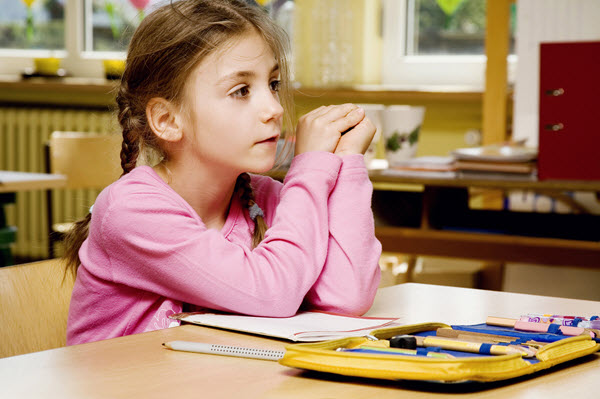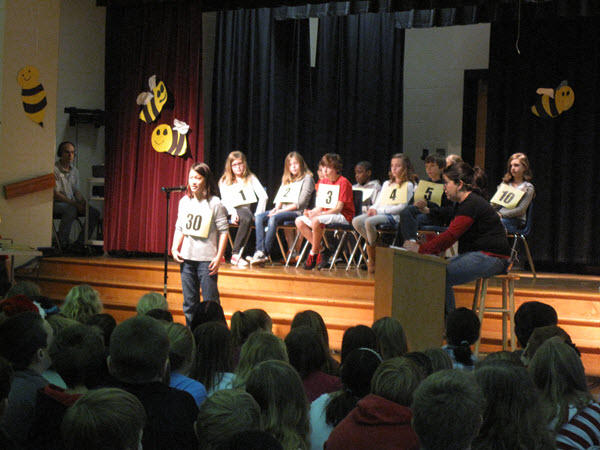Are Spelling Bees Good for Child Development?
By Martina Trejo
April 12, 2017 • Fact checked by Dumb Little Man

Can you use the word scherenschnitte in a sentence? How about if you had to spell it in front of over 1 million people? If you’re like me, you’d be flabbergasted by the word.
Scherenschnitte happens to be the winning word in the 2015’s National Spelling Bee.
The Scripps National Spelling Bee , which takes place every year on Memorial Day weekend, has been a phenomenon since 1925. It started when the Louisville Courier-Journal Newspaper got together with several other papers to make a number of local competitions into one massive vocabulary rodeo. Gaining in popularity over the years, the lexicographic tournament now includes sponsorship from Amazon Kindle, live prime time coverage on ESPN, and even its own Broadway musical.
During its 92 years, prizes for the winners have risen from $500 in gold pieces (at the first ever bee) to $40,000 in cash (plus other ancillary prizes). In addition to that, the winner also gets a chance to win a sponsorship for college. This reflects the Bee’s purpose to “help students improve their spelling, increase their vocabularies, learn concepts and develop correct English usage that will help them all their lives.”
But, can it fulfill that promise?
The Bad
Memorization may not promote literacy
Detractors say that memorizing words gives students little to no assistance in reading comprehension. An Australian literacy study demonstrated that phonetic understanding was a much better teaching tool than simple memorization.
There is no doubt that children endeavoring to learn these words are gaining some vocabulary, but could all that effort be put to more active educational use? Memorization, it is often said, is the lowest form of learning.
See Also: 7 Tips on How to Improve a Child’s Working Memory
It puts too much pressure on young children
There are Bee horror stories about students forced to memorize words by overzealous parents who subsequently crack under the pressure. One year, a contestant named Akshay Buddiga fainted in the middle of the bee while spelling the word “alopecoid”.
A lot of people thought that the competition was just too much to handle. The participant was just a kid who’s under 14 years of age.
Should spelling bees be banned?
Every year, there are numerous protesters against the bee. Some say that these competitions stigmatize children with learning disabilities, like dyslexia. Other protests come from organizations, like the American Literacy Council, who claim that spelling bees promote the worst and most confusing parts of English learning.
The Good
It promotes a wonderful way to learn to love to read
Obviously, learning vocabulary words has its own rewards.
An Education.com article quotes former Scripps National Spelling Bee judge Linda Wood, (and senior editor at Merriam-Webster) who refutes the idea that spellers learn entirely by memorization: “The way the children learn the words is not just by rote studying, but through etymology and learning roots, pronunciations, and multiple definitions. This is invaluable in terms of building vocabulary… with better reading comprehension, comes greater literacy, and greater enjoyment of reading, literature, and language. All from understanding words.”
And with the recent addition of contestants having to know definitions as well, the idea that kids are just learning to memorize is perhaps dispelled.
See Also: 7 Reasons To Start Reading Books? Here’s why!
Healthy competition teaches determination, poise, and perspective
Though the competition is said to be a bit traumatizing, spelling champions still gained a great deal from the experience. And though they quote the experience as nerve-wracking, it gave them more confidence.
It promotes diversity
Winning spellers over the last several years have often been children of recent immigrants. Their representation in a competition that is so iconically American is inspirational for their communities. Competitors from other countries feel inspired to join the competition and this creates international cultural connections for those involved.
Opinions differ when it comes to the National Spelling Bee. Fans of obscure English words rejoice once a year. On the other hand, at least 1 million viewers can’t wait to see how many competitors will fall into a linguistic guetapens (2002’s winning word – meaning snare or trap) before there’s a new champion.
You can test your own vocabulary skills by checking out the infographic below. It includes a list of the winning Spelling Bee words over the past 50 years.




